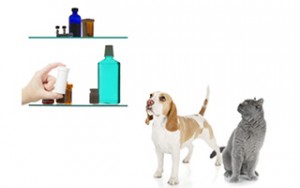- Over-the-counter medications: For the first time ever over the counter medication and supplements topped the list with more than 28,500 cases reported. This category is exceptionally large, encompassing nearly 7,000 different products.
- Human prescription medications: Prescribed human medications represent nearly 16% of all reported cases.
- Insecticides: Insect poisons accounted for nearly 9% of the calls to APCC (ASPCA Animal Poison Control Center).
- Human foods: Generally dogs are more likely to ingest human food. The ones that can cause serious trouble are onions, garlic, grapes, raisins, alcohol and xylitol. More than 14,600 APCC cases in 2015 involved human foods.
- Household items: Products found around the home made up more than 14,000 cases in 2015. The most common items for this category include cleaning products, fire logs and paint.
- Veterinary medications: Overdoses of medications prescribed by veterinarians represented more than 7% of total cases in 2015. Chewable medications are very appealing to pets, requiring extra caution.
- Chocolate: Chocolate continues be very problematic for pets, accounting for more than 7% of all APCC cases in 2015—averaging more than 30 cases a day. The darker the chocolate, the more dangerous it can be.
- Plants: Indoor and outdoor plants represented nearly 5% of the calls to the APCC in 2015. Most of these calls involve cats and houseplants. Be sure to understand the toxicity of plants before putting them in or around your house.
- Rodenticides: Rodent poisons can be just as toxic to pets as they are to the mice and rats these products are designed to kill. Last year, APCC handled more than 8,100 cases involving rodenticides.
- Lawn and garden products. These products, including herbicides and fungicides, round out the top ten, accounting for 3% of all APCC calls. It’s incredibly important to store lawn and garden products out of the reach of pets.
A few suggestions:

- Do not leave over-the counter or prescription medications or supplements out on tables, counters, or in areas where your curious four legged companion may be able to get into them. Generally, my clients and their animals are taking the same supplements so in my opinion this does decrease the danger to your animals.
- Try to use cleaning products that are green and do not contain harmful ingredients. Cleaning with water, vinegar, baking soda, therapeutic grade essential oils…. will be safer for both you and your dog/cat!
- If possible do not leave food out on counters or the table. I also suggest that you have a garbage pail with a safety lid or keep the garbage bin in a closed cabinet.
- There are natural rodent deterrents. For example peppermint, clove oil and hot pepper spray (made with habaneros) can be used to deter rodents.
Keep your animals safe and FREE from harm or danger!
